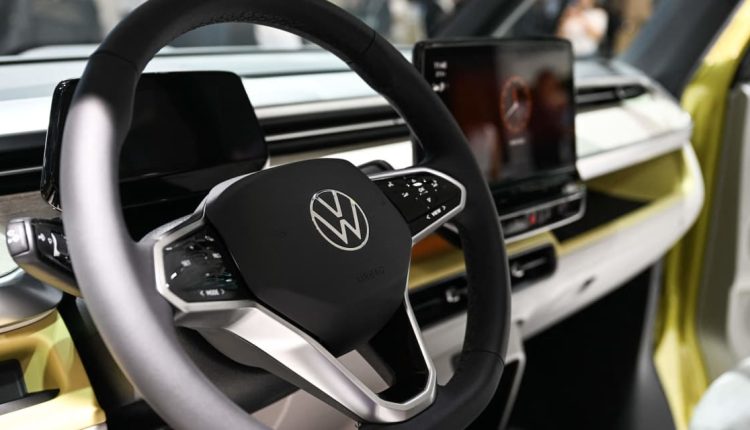Ford Motor,
General Motors,
and
Mercedes-Benz
are all lamenting how tough the electric vehicle market has become., and
Volkswagen
is complaining about profitability, too. Blame
Tesla.
Tesla, remember, elected to start a price war to maintain its EV sales. And the results of that decision are now showing up in the results of EV makers, whether start-ups or traditional auto makers.
Thursday, Mercedes-Benz (ticker: MBG. Germany) became the latest casualty of the price war. The German auto maker reported third-quarter numbers that included some disappointing guidance. Free cash flow for 2023 is expected to be “slightly above” prior year levels of about $8.9 billion. Wall Street was looking for $10.8 billion. Mercedes stock was down 6.1% in overseas trading.
“Intense price competition, particularly in the electric vehicle segment,” was partly to blame, Mercedes said in its earnings release.
Said another way, it’s all Tesla’s (TSLA) fault. The EV leader has cut prices significantly for its cars in 2023. CEO Elon Musk has said the cuts are designed to boost volume growth and keep EVs affordable in the face of higher interest rates.
Mercedes’ update follows disappointing EV news from GM (GM) and Ford (F). GM, on Tuesday, backed off some of its more aggressive EV goals for 2024. Ford recently slowed production of its F-150 Lightning electric truck. Ford didn’t blame the market, but it raised fears of slowing sales for investors.
It’s making investors nervous about the hundreds of billions committed by the world’s auto makers to an EV transition. And they’re right—something is wrong with EVs. It doesn’t appear to be demand, however. Sales of Mercedes’ battery-electric vehicles, or BEV, grew 66% year over year in the third quarter and accounted for about 12% of total unit sales.
Mercedes is outpacing the market. BEV sales in China, Europe, and the U.S. are up in the range of 40% year to date.
That isn’t the case for Ford and GM which play mostly in the U.S. American BEV sales are up about 50% year to date in 2023 compared with 2022, and they account for about 7% to 8% of all light vehicle sales. GM and Ford are lagging behind with BEV sales accounting for about 3% of total volume for both.
Auto makers not named Tesla seem to have a combination of three problems. Weak pricing, high interest rates, and the desirability of their own EVs.
Some traditional auto makers are simply doing better than others.
BMW
‘s (BMW. Germany) EV sales were up 80% year over year over year in the third quarter, even better than Mercedes’ 66% growth. Volkswagen’s (VOW. Germany) year to date BEV sales are up 45%. VW’s BEV sales in the U.S. amount to roughly 12% of total volumes.
Volkswagen, which reported third-quarter earnings Thursday, is also having issues. The company said it “cannot be satisfied with profitability, which in the third quarter fell short of our ambitious targets.” Operating profit came in at about $5.2 billion, while Wall Street was looking for $5.8 billion. Shares were down 1.3% in overseas trading.
One solution for Ford and GM is to rethink their offerings so they can get traditional Ford and GM buyers into their EVs. GM just started selling the all-electric Chevy Blazer. That won SUV of the year at MotorTrend on Wednesday.
Luxury brands, such as BMW and Mercedes, are also doing better, and that’s showing up in GM’s numbers. Its Cadillac Lyriq sold 3,018 units in the third quarter, about 8% of total Cadillac volumes. Not bad and better than the GM numbers overall.
BMW, Mercedes, and Volkswagen also have the advantage of Europe, where EV sales account for roughly 15% of total light vehicle volumes. The percentage of BEV sales has hit 20% in recent months.
Still, the biggest problems all auto makers face are lower prices and higher rates. Tesla, essentially, controls EV pricing, especially in the U.S. where it has captured about 56% share so far in 2023.
When Musk will stop cutting prices is anyone’s guess. He wants to see lower rates, but then again, so does everyone else. No auto maker, not even Tesla, controls interest rates.
And no EV maker, not even Tesla, is emerging unscathed from a battle Musk chose to start. Through early trading Thursday, Tesla stock was down 18% since the company provided a disappointing third-quarter update on Oct. 18. The
Nasdaq Composite
and
S&P 500
were down about 6% and 5%, respectively.
There may be more to go before all is said and done.
Write to Al Root at [email protected]
Read the full article here

